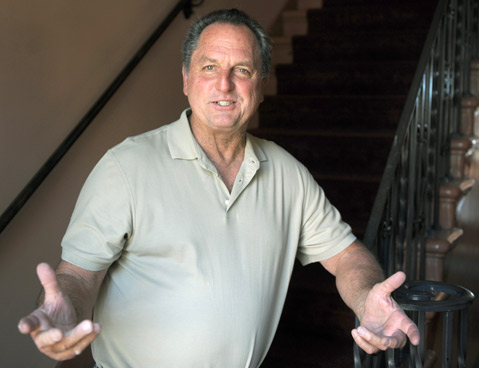Toga Party for Dario Pini?
Santa Barbara Landlord Finds Himself in Hot Water

Dario Pini is hardly the typical Santa Barbara landlord. But Debbie Toga is hardly Santa Barbara’s typical aggrieved neighbor, either.
For the past seven years, Pini — famous for the large number of tenants he packs into his even larger number of holdings — has emerged as a significant player in Santa Barbara’s choice West Beach neighborhood, famous for its delectable ocean views and cozy red-tiled cottages scrunched tightly together. When Toga — a nurse specializing in rare genetic-disorder therapies — and her husband — a world-renowned expert in brain imaging technology — bought a two-bedroom home on West Mason Street 18 months ago, they thought they’d died and gone to heaven. Six months later, they wondered if they’d taken an accidental U-turn and wound up in hell.
Pini, it turned out, owns the property next door at 109 West Mason, and most of his tenants, the Togas would soon discover, were globe-trotting bar-hoppers who’d arrived in Santa Barbara from all corners of the planet to learn the English language. And the rest were subcontractors from Exxon’s Las Flores Canyon facility who worked hard and partied harder. For the Togas, the drunken barbecues at 3 a.m. in their neighbors’ backyard proved too much. All the constant noise prompted the Togas’ tenants — occupying the two adjoining studios — to flee as fast as they could.
Debbie Toga wasn’t shy about calling Pini, who owns two apartments and two hotels within the same block. And Pini, she said, has always been accessible, amiable, and responsive. “He’d come right over in the middle of the night. He’d say he was going to take care of it. But nothing ever changes,” she complained. “It’s always a fire drill, but two days afterward, the chaos and noise are back.” Toga took her case to City Hall, and last Thursday — at her instigation — two beat coordinators with the Santa Barbara Police Department convened a neighborhood meeting at the Veterans Memorial Center. About 40 people showed up.
Among them were two city councilmembers — Cathy Murillo and Dale Francisco — and notable political heavyweights Jim and Sharon Westby — influential strategists and supporters of the council’s conservative faction. Officers Kent Wojciechoski and Adrian Gutierrez encouraged those attending to get to know their neighbors, form a neighborhood watch, file complaints, and get together on a regular basis. But those attending wanted action. How long would it take, they demanded, before City Hall did something? One couple with a young child complained there was drug dealing around one of Pini’s Mason Street properties and that police have investigated reports of prostitution. They wanted video cameras. They wanted legal action. They wanted fines. “There are things going on in the background we can’t talk about,” said Officer Gutierrez, referring, perhaps, to the fact that the city attorney had sued Pini for operating 109 West Mason — a 12-unit apartment — as a motel, which is illegal, and not paying bed taxes.
Pini did not attend the Thursday meeting. Had he attended, he said, he would have explained much of the noise is caused by people who frequent parties at the nearby vet center, get drunk, and then hang around the neighborhood after the center shuts down at 10 p.m. One such inebriate, wielding a knife, chased another person across his parking lot, Pini complained. He’s had to refund Villa Rosa patrons because of the noise these people have made. “It’s not pretty,” he said. Pini acknowledged some of his tenants caused problems, but he stressed that he “addressed the problems immediately.”
While Pini is perhaps best known for renting to large immigrant families, he’s also tapped into Santa Barbara’s expanding market of foreign students looking for temporary digs. “I don’t want to sound prejudiced,” Pini said, explaining that students from Ireland, Brazil, and Saudi Arabia caused serious problems. Because they were monthly rentals, he said he couldn’t just evict them overnight. Instead he’d move them to his other nearby properties where they’d be less immediately disruptive to the peace of their neighbors. The point is, he said, they’re gone. And the subcontractors working for Exxon, he acknowledged, got rowdy after they got off work at 5 a.m. They too are gone, he said, and he won’t rent to them again. As for accusations of drug dealing and prostitution, Pini said, “That’s news to me.” Given that he pays someone to keep an ear glued to the police scanner for trouble arising at any of his rentals, Pini would know.
Pini has been an impact player in Santa Barbara’s rental market for 45 years. In the 1990s, city police conducted a massive inspection of all his properties — then 34 within city limits — and issued 755 health and safety citations. The city attorney prosecuted Pini for unfair business competition, and when Judge Frank Ochoa offered Pini a choice between serving time in one of his apartments or jail, Pini famously opted for jail. Pini takes offense at the slumlord tag, pointing out with considerable justification he’s done more to house Santa Barbara’s immigrant workforce than anyone else. That may be, but neighbors of Pini properties are quick to complain about problems associated with overcrowded properties — uncollected trash chief among them. One Westside resident, concerned about a property Pini is now subdividing, just filed a petition with City Hall signed by 50 of her neighbors to intervene.
Even Pini’s harshest detractors concede he works morning, noon, and night. His rental operation, big in the 1990s, has grown considerably since then, though by how much is unclear. City Hall estimates he has more than 100 properties, to which Pini says only, “I have a few.” Pini is also fast to acknowledge City Hall has never lost interest in his business dealings. “I’ve been under the microscope with these people,” he said. Perhaps that’s one reason he hires a real estate consultant who specializes in litigation strategy and risk management.
Whether Pini and Toga can get along has yet to be determined. Pini, speaking of Toga, said “We need people like her in the neighborhood.” Toga — who with her husband was on a hijacked airplane in 1985 and lived to tell the tale — said she’s not about to move or roll over. Her efforts, she acknowledged, have clearly paid off. “In the past few weeks, it’s been pretty quiet around here,” she said, “but I just wonder for how long.”



